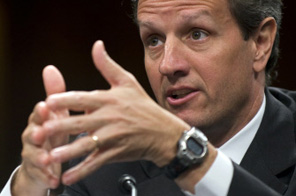Investment, recovery top Geithner’s agenda
WASHINGTON: On his first trip to the Middle East as Treasury Secretary, Timothy Geithner's message this week will be similar to the one he delivered to Chinese officials a month ago: your investments in the United States are safe.
Geithner is expected to repeat assurances that the government's soaring budget deficits will not trigger a devastating bout of inflation that sinks the value of the dollar and foreigners' holdings.
Geithner is scheduled to hold high-level meetings on Tuesday and Wednesday with top government officials and leading business executives in Saudi Arabia and the United Arab Emirates.
In advance of those meetings, Geithner stressed in an interview broadcast Sunday that the administration was committed to protecting the value of the dollar and maintaining investor confidence in the U.S. financial system.
"A strong dollar is in the interest of the United States. Of course, I deeply believe that," Geithner said on CNN's "Fareed Zakaria GPS." "Our commitment ... to the world and of course, the American people, is to make sure we'll put in place the policies that can sustain confidence in this economy and this financial system," he said.
But many private economists believe the administration needs to do more to address worries about America's soaring budget deficits.
"We have a fiscal policy that will ultimately undermine the value of their holdings and that has got foreign investors nervous," said Mark Zandi, chief economist at Moody's Economy.com.
"They are seeking assurances that the U.S. is committed to dealing with its long-term deficit problems." On Monday, the government is expected to announce that the deficit through the first nine months of this budget year hit an historic milestone in June, topping $1 trillion.
Geither will stress that the Obama administration is committed to bringing down the deficits once the country has emerged from the current recession and financial crisis, said a Treasury official, who briefed reporters on condition of anonymity.
The trip also includes a stop in London on Monday to confer with British Prime Minister Gordon Brown and top officials in his government. On Thursday, Geithner meets with French finance officials.
But the discussions that will be most closely watched will occur in the Middle East.
In the United Arab Emirates, Geithner will meet with officials of government-run investment funds, known as sovereign wealth funds, which have poured billions of dollars into U.S. banks and other companies. The Saudis also recycle significant petro-dollars into U.S. investments.
The Obama administration, just like the Bush administration, has to walk a fine line between insisting that the United States remains open to foreign investment while guarding against the type of public furore that ended up blocking the efforts of Dubai-owned DP World to manage six of the largest ports in the United States in 2006.
Another key topic for Geithner will be oil-price stability - or lack thereof - and its impact on the global economy. After falling close to $30 per barrel, crude oil prices had been rising steadily, peaking two weeks ago above $73 per barrel, before retreating a bit last week.
Economists are concerned that the U.S. economy, struggling to emerge from the most prolonged recession in the post-World War II period, could suffer a serious setback if oil prices surge again.
The Saudis, who account for close to a third of OPEC's total production, have said they can live with oil at $50 a barrel. But they support the general view of the Organization of Petroleum Exporting Countries that prices of $75 to $80 are needed over the longer term.
Treasury officials who briefed reporters on the trip said that Geithner will also touch on: - U.S. efforts to combat terrorist financing - The possibility of increasing sanctions on Iran if it does not forgo its nuclear programme - Measures being considered in the United States and other countries to try to avoid a repeat of the current financial system crisis, the worst to hit America in seven decades.
Treasury officials said that Geithner would give his British and French counterparts an update on the administration's efforts to overhaul financial regulations and jump-start the economy with a $787 billion stimulus plan.
In March, Chinese Premier Wen Jiabao said that China was concerned about the "safety" of the large amounts of money it had lent to the United States, while Zhou Xiaochuan, the head of China's central bank, suggested that monetary officials should explore the possibility of an alternative to using the dollar as the world's leading reserve currency.
Since Geithner's trip to China, officials there have continued to make comments about the need to move away from the dollar as the world's major reserve currency.






